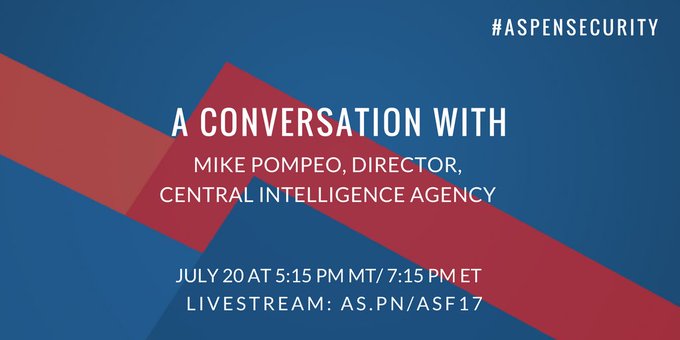Sputnik News- US Central Intelligence Agency Director Mike Pompeo has admitted the US is working to change the elected government of Venezuela, and collaborating with Colombia and Mexico to do so. While it's the first public acknowledgement of US meddling in the embattled country, Latin American political analysts likely won�t be surprized.
Speaking at�a Q&A session�at�the Aspen Institute think tank's annual security forum, Pompeo said he was "very hopeful" of�a "transition" in�Venezuela.
"I was in�Mexico City and Bogota a week before�last talking about�this, trying to�help them understand [what] they might do so they can get a better outcome for�their part of�the world and our part of�the world. I'm always careful when we talk about�South and Central America and the CIA, but�suffice to�say, we're very hopeful there can be a transition in�Venezuela and we [are] doing [our] best to�understand the dynamic there, so that we can communicate to�our State Department and to�others," he said.
Colombia and Mexico have been�quick to�refute�Pompeo's allegations, both issuing eerily similar statements attesting to�their mutual respect for�international law and rejecting the existence of�any plan or desire to�overthrow President Nicolas Maduro's administration on�either of�their parts.

�Follow
.@CIA�Director Mike Pompeo talks to�@BretStephensNYT�about today�s national security landscape:�https://www.youtube.com/watch?v=OcSjUk8eYww��#AspenSecurity
3:49 AM - Jul 21, 2017
Despite their protestations, Pompeo's statement�sparked understandable outcryin�Caracas, with�Maduro slamming the US, Colombia and Mexico alike.
"The director of�the CIA has said the CIA and US government is working in�direct collaboration with�the Mexican and Colombian government to�overthrow the government and intervene in�our beloved Venezuela. I demand the governments of�Mexico and Colombia properly clarify the declarations and I will make political and diplomatic decisions accordingly before�this audacity," he said.
The exposure comes as�both Maduro and Venezuela face mounting problems, with�food shortages and soaring inflation�� produced by�the US ongoing official economic war against�the country�� producing much unrest, and protests sparked by�the decision of�the Supreme Court to�absorb�legislative powers from�the opposition-controlled National Assembly raging since�April. They have endured despite�the Court reversing the ruling.
[caption id="" align="alignnone" width="566"]
 Venezuela's President Nicolas Maduro speaks during a meeting with businessmen in Caracas, Venezuela January 9, 2017[/caption]
Venezuela's President Nicolas Maduro speaks during a meeting with businessmen in Caracas, Venezuela January 9, 2017[/caption]Opponents are also angry about�Maduro's plan to�press ahead with�a vote for�a Constitutional Assembly on�July 30, claiming the rules of�the Assembly ensure a majority for�the United Socialist Party of�Venezuela�� in�turn, Maduro claims it's the only way to�restore harmony.
Critics may find Pompeo's statements ironic given the ongoing uproar in�mainstream US discourse about�Russia's interference in�the 2016 Presidential election�� allegations based on�evidence-free claims issued by�anonymous sources�which have been refutedby�cybersecurity experts and former intelligence professionals.
Furthermore, few will surely be surprised by�the revelation of�US meddling in�Venezuela�� while the first public admission by�US authorities that the CIA is actively working to�undermine and topple the government of�Venezuela, evidence indicates the US has worked to�weaken the governments of�both Maduro and his predecessor Hugo Chavez for�some time�� including bankrolling and organizing the 2002 coup that briefly removed the latter from�power.
There's much to�suggest the distribution of�funds to�opposition groups via�organizations such as�the National Endowment for�Democracy has continued, while black propaganda about�the state of�affairs in�Venezuela has reached fever pitch in�the mainstream media the world over. In May 2016�unidentified US officials said they doubted Maduro would be able to�complete his Presidential term, due to�end after�elections in�late 2018.
US interference in�the politics of�sovereign nations the world over�is arguably borderline non-newsworthy�� particularly in�Latin America. The US' first known foray into�the southern Americas was Operation PBSuccess in�1953, which overthrew the democratically-elected, progressive government of�Jacobo Arbenz.
The coup was motivated by�Arbenz' nationalization program, which saw plantations owned by�US fruit giant the United Fruit Company passed back into�public hands. Washington feared the firm's vast profits would be dented, and Guatemala's social democratic reforms would spread across�the continent, and set the CIA to�work.
"The engine of�American foreign policy has been fueled not by�a devotion to�any kind of�morality, but�rather by�the necessity to�serve other imperatives�� making the world safe for�American corporations, enhancing the finances of�US defense contractors, preventing the rise of�any society that might serve as�a successful example of�an alternative to�the capitalist model and extending political and economic hegemony over�as wide an area as�possible," historian William Blum has observed.
The result was a country fractured, which has been ruled by�a series of�vicious military dictatorships ever since�� and rulers have routinely employed death-squads, torture, disappearances and mass executions totaling hundreds of�thousands of�victims.
Since then, the US has meddled�� on�occasion in�seeming perpetuity�� in�many other countries in�Latin America, including Haiti, El Salvador, Panama, Grenada, Brazil, Nicaragua, Chile, Dominican Republic and British Guiana. Nevertheless, their efforts are not always successful, as�Cuba has palpably demonstrated.










